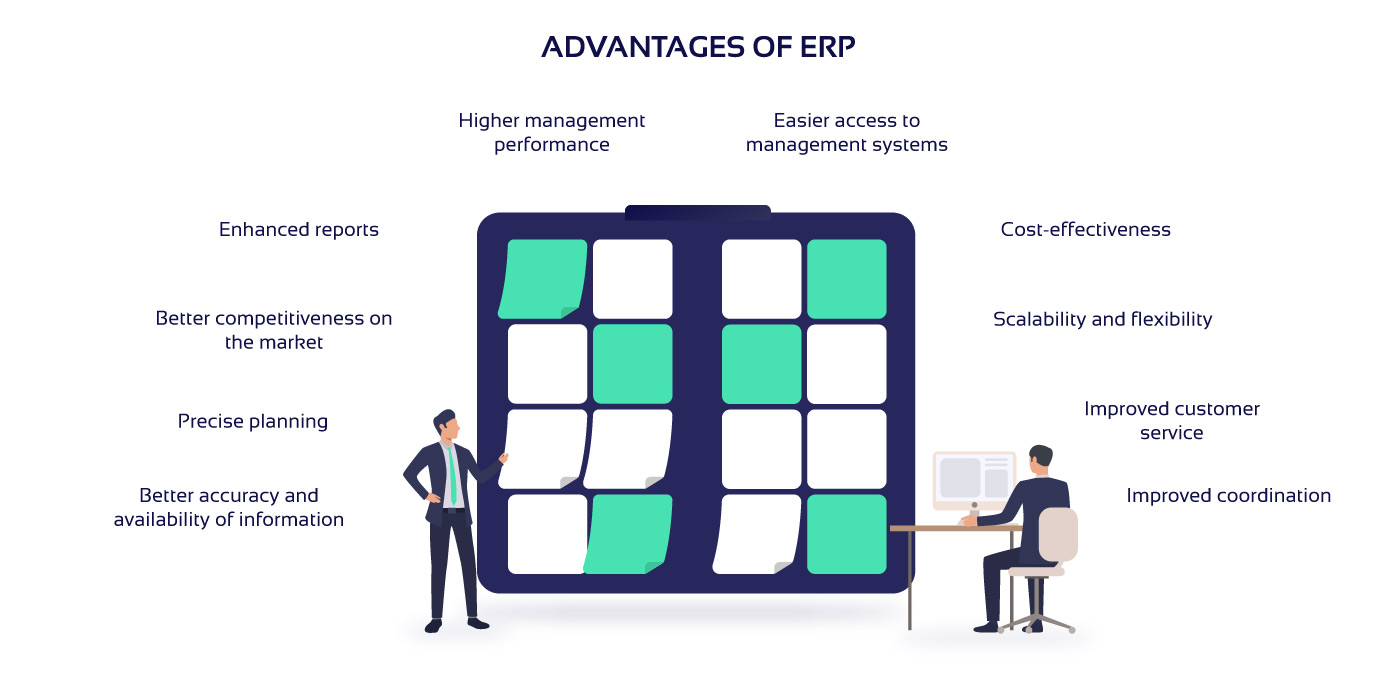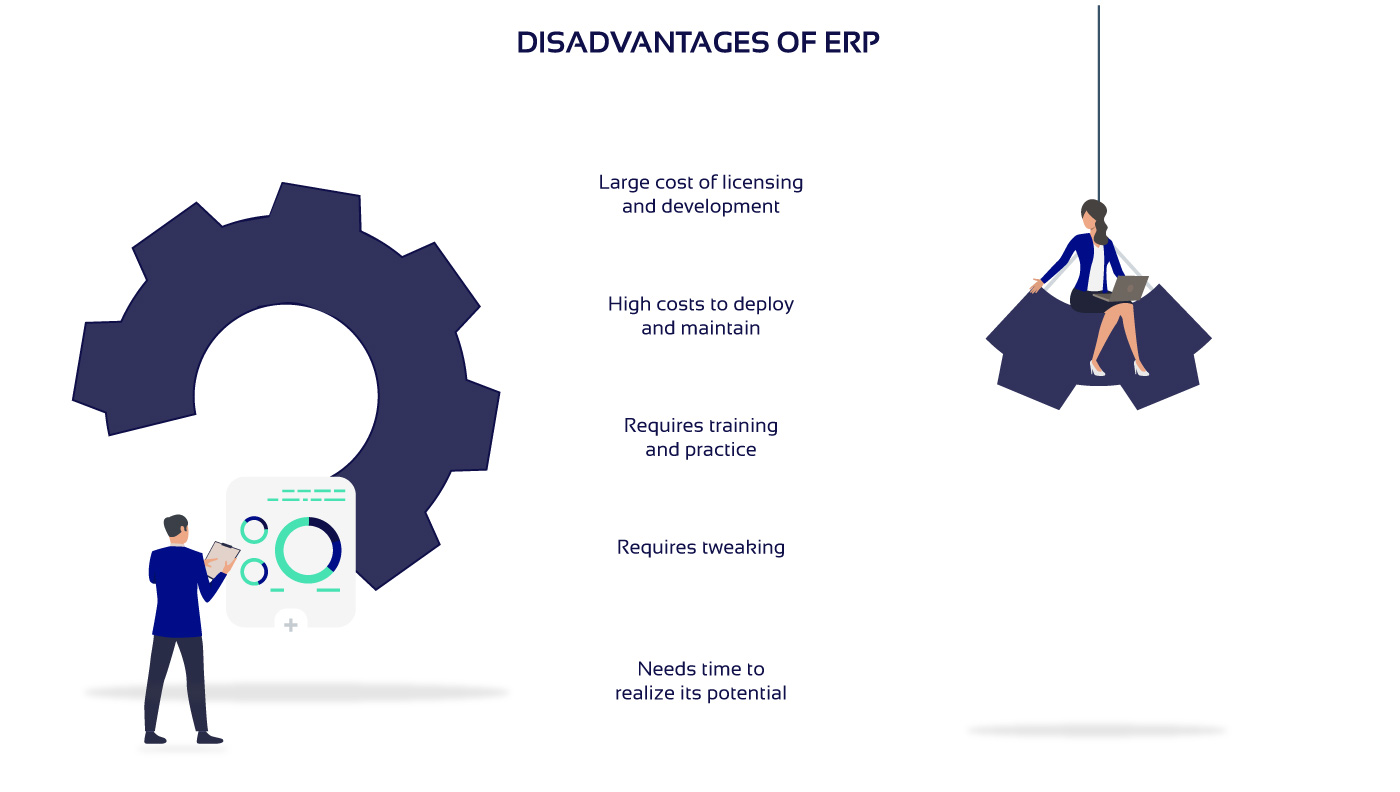Running an effective enterprise requires experience, skills, and business acumen, but most of all – wise management of business processes, and use of advantages of enterprise resource planning. In the contemporary business landscape, the inherent competitiveness of markets compels entrepreneurs to capitalize on every conceivable opportunity, embracing technological advancements to optimize efficiency and maintain a competitive edge over their adversaries.
ERP software has long since established its dominance in the field of software solutions for business. This article will summarize the reason for this phenomenon by detailing the ERP benefits as well as answering the reasonable question, “What are the disadvantages of ERP?”
ERP System Concept and Classification
Before we dive deeper into the advantages and disadvantages of ERP, let’s specify the terms and determine what we mean when we discuss an ERP system.
ERP software—an integrated system that helps companies control, maintain, and administer all business processes. A suite of apps forming an ERP solution will vary depending on the company’s size and specifics, but the core of an enterprise resource planning system always covers essentials like finance, HR, distribution, management, supply chain, sales, customer relationship, etc.
As the ERP software keeps dominating the global market (the revenue is expected to hit USD 52.33B in 2024), today’s entrepreneurs have a wide variety of resource planning systems to choose from.
The classification of ERP software can be tricky as there are many ways to categorize such diverse digital solutions. However, we will give the primary ERP software selection layout so that you can have some other factors besides ERP system benefits to back up your choice.
ERP system classification by type of deployment:
- Cloud ERP systems — the software is available via “the cloud” with on-demand access. The benefits of ERP system based in the cloud include extraordinary flexibility, cost-effectiveness, and lower technical load. This makes cloud ERP the most popular type of resource planning software by a landslide.
- On-premise ERP suite — an enterprise resource planning system based on the company’s servers. The benefits of ERP that is on-premise are significant. Some examples are maximum control over the system, easy customization, and higher data security compared to a cloud ERP.
- Hybrid ERP software — digital solutions combining both deployment approaches offering ERP benefits from on-premise and cloud ERP solutions simultaneously. However, a hybrid ERP system is typically more expensive to create and manage.
Categorization by ERP system's features:
- Generic ERP system — usually off-the-shelf software covering only core business processes management and automation. Generally, the cheapest out of today's ERP systems.
- Extended ERP solution — robust business systems helping to automate and control more business processes within a single platform.
- Vertical ERP platform — an ERP system containing features and modules created specifically to meet the needs of a company working in a certain market niche. For example, a healthcare ERP system will include modules like Electronic Health Records management and Clinical Decision Support.
- Custom ERP system — a type of business software created from scratch by a software development team. Such platforms are tailored to meet all of the customer’s business needs and are known to offer enhanced data security, real-time data management, better customer service, and overall smoother customer experience than ready-made ERP software.
ERP system classification by size:
- Enterprise-level software — an ERP for large companies is known to have more extensive functionality and a greater amount of modules covering different aspects of the workflow that may not even be relevant for smaller businesses. For example, it can be streamlined interaction between different departments located around the globe or automatic data conversion into a specific format relevant to a particular section of the company. Moreover, enterprise-level ERPs usually require a dedicated IT team that will take care of the centralized system and keep it updated and accessible at all times.
- Medium to small-level systems — these platforms are typically much simpler. Small and medium-level ERP implementation is quicker and cheaper. However, such systems may not include more advanced functionality from the get-go. For example, off-the-shelf ERPs for small businesses usually do not have real-time data analysis, accurate forecasting tools, robust data security mechanisms, and other useful functionality. However, if a business owner chooses bespoke software development, the ERP, even for a small company, will contain everything a customer considers useful.
As we got the definition and the categorization out of the way, let’s dive deeper into the benefits of enterprise resource planning software and the disadvantages of ERP. Starting with the key benefits.
Advantages of ERP
It was already mentioned that enterprise resource planning software offers multiple powerful opportunities that may be turned into profitable perks by a skillful person. So, let’s cut to the chase and review the potential benefits of enterprise systems.

1. Higher management performance
ERP software functions as a central hub, creating connections across all facets of enterprise management, encompassing human resources, production, sales, customer support, inventory, and the orchestration of supply chain operations. Leveraging computer technologies, ERP software facilitates the swift and efficient automated handling of business data.
A standout benefit of implementing enterprise resource planning solutions lies in the substantial reduction of paperwork and the diminished reliance on manual data entry. This not only minimizes the risk of human errors that could potentially disrupt production processes but also eliminates the necessity to convert paper-based data into digital formats, freeing up human resources for more direct and impactful tasks.
For this specific reason, many business owners consider ERP implementation as a sure-fire way to increase operational efficiency and allocate resources more effectively.
2. Better accuracy and availability of information
This is one of the core benefits of ERP that, one way or another, influences all the rest of the enterprise resource planning advantages that made it to this list.
Sophisticated ERP systems empower the efficient and centralized gathering, processing, and retention of information pertaining to production, sales, supplies, or customers. One centralized system eliminates the need for maintaining numerous separate databases, requiring constant scrutiny and synchronization to remove outdated or duplicated records.
The heightened quality of internal data, coupled with its seamless accessibility to staff across relevant departments, represents a significant achievement fostering enhanced performance throughout the enterprise. Notably, the ERP implementation particularly amplifies the benefits in activities such as supply chain and inventory management.
3. Improved coordination
The cohesive system amalgamating business data and customer information serves to bolster collaboration among various enterprise branches or departments. By mitigating communication delays throughout the entire company, ERP software not only amplifies efficiency but also indirectly lowers operational costs. This advantage proves particularly valuable for companies with a dispersed network of affiliates spanning several states or even different continents. This way, all of the company’s employees will feel more secure and will eventually become more productive as their work will be supported by a fail-safe and reliable internal system.
4. Precise planning
The ease of accessing a wealth of business information profoundly simplifies its analysis, providing a foundation for charting a strategic course for further development and fostering future growth. Management teams and business analysts within the company can harness the power of aggregated data more efficiently, enabling the formulation of innovative strategies or recommendations for enhancing existing ones. Moreover, one of the benefits of ERP in this regard is the ability to quickly analyze data and transform it into valuable insights by means of artificial intelligence and machine learning algorithms. A custom ERP system simplifies risk management and provides the business with greater flexibility, which is essential for sustaining competition in the modern market.
5. Enhanced reports
Due to streamlined paperwork and enhanced interdepartmental communication, ERP software provides a user-friendly platform for the swift and effortless generation of various reports, spanning from invoice generation to inventory, customer behavior, technical maintenance, and beyond.
As all of the reports are stored and transmitted digitally, access to the information is always instant and uninterrupted. Besides, there’s always a way to protect sensitive data by installing different access levels for different kinds of users. Not to mention, establishing extensive data protection mechanisms is essential for achieving regulatory compliance in many industries.
6. Scalability and flexibility
Another one of the inherent benefits of ERP platforms is determined by their modular structure. It permits scaling adjustments based on current business needs and conditions. This feature enables a resource planning system to effortlessly accommodate the company's expansion or reduction at every level.
Even the most trivial changes in the company structure and operation, such as the appearance of new products, workers, production facilities, suppliers, departments, etc., demand high flexibility in ERP solutions. Whether it's amplifying production, extending inventory, introducing new functions and services, or welcoming additional users, ERP software adeptly manages not only these transformations but also a myriad of other adjustments with seamless efficiency. This is especially true for hybrid and cloud systems where scaling the system up and down will literally take a few clicks and a couple of minutes.
7. Cost-effectiveness
As a result of reduced paperwork and optimization of daily routines, most of all – a decrease of repetitive tasks, ERP systems help to achieve cost savings on administrative needs. Besides, resource planning solutions greatly speed up and reduce costs of business operations that involve various information requests and approvals, such as logistics, stock and supply chain management, etc.
8. Easier access to management systems
Tailoring to specific resource planning requirements, ERP software can be deployed as web or mobile applications enriched with cutting-edge cloud technologies. This configuration enables seamless operation on smartphones, laptops, and various portable devices, ensuring accessibility at any time and from nearly any location.
9. Improved customer service
A tangible advantage of contemporary ERP software lies in the refinement of customer relationship management. Through centralized data storage, essential information regarding sales and clientele is consolidated, streamlining communication for sales managers and customer support staff. This not only facilitates more efficient interactions with clients but also diminishes response time to customer requests.
Faster access to accurate data and complete customer histories with relevant updates also add to other benefits of ERP listed here. For example, accurately collected and analyzed data on customer behavior patterns may lead to strategy optimizations or more precise demand forecasting that must be satisfied accordingly and in proper time. More than that, the company’s efforts directed towards ensuring maximum client satisfaction will eventually have a positive impact on brand loyalty as well as sales and repurchase rates.
10. Better competitiveness on the market
This last advantage is, in fact, the summary of all the aforementioned benefits of ERP relayed in the perspective of business profits. The point is that ERP systems give the most needed competitive advantage to the enterprise, an extra device to outperform the rivals. While some companies stick to time-proven methods or simply cannot afford a modern ERP system, others enhance their businesses with technological advances and reap the profits.
A new ERP system that is fully customized to meet all of the needs and goals of a particular business helps said business to fully control the technical aspects and the real-time condition of all business operations. This way, the company management is always aware of the current situation and has all the tools needed to act on the environment faster than the competitors.
Disadvantages of ERP
The benefits of ERP solutions are undeniable, yet there are several drawbacks that must be examined before trying to implement such enterprise resource planning systems in a particular business company. If a business owner fails to overcome and negate these disadvantages, an ERP solution would lack efficiency or even be unfeasible or meaningless, becoming a solid waste of money instead of a way for cost savings and business growth. 
1. Large cost of licensing and development
ERP solutions are very complex, and their development is a difficult and, accordingly pricy process. Building a resource planning system according to customer specifications requires an experienced and numerous team with a high level of expertise. High skills demand high wages per hour, so the resulting price of a custom-made solution may be quite hefty.
Ready-made ERP systems are faster options, though the licensing costs are also rather steep. The lower prices of ready solutions also involve worse flexibility, longer customization periods, possible maintenance and security risks, or even incompatibility with the company processes and business needs. Sure, there are certain cases in which an off-the-shelf ERP may be a perfect alternative to a custom solution. However, we highly recommend anyone who is considering this path to complete in-depth research prior to buying a ready-made on-premise or cloud ERP system.
2. High costs to deploy and maintain
If you think that the prices of ERP systems are too high, there is some bad news for you. The implementation and maintenance of such solutions involve even larger expenditures and require hiring additional tech staff. As for ready-made solutions, they need regular updates that may involve additional expenses. However, remember that these investments will eventually pay off thanks to the improved efficiency of the whole enterprise.
Please note that going for a cloud ERP is a way to reduce deployment and maintenance costs. However, a business owner should be ready to sacrifice flexibility (at least to some extent) and control over the system.
3. Requires training and practice
The complexity of ERP software solutions brings additional requirements to the staff who use it. Learning at a minimum the basics of a resource planning system may take considerable time and effort and requires significantly more to master all its functionality.
Another related drawback is that when experienced users of an ERP system leave the company, the newcomers who fill their positions must spend a varied amount of time learning it from scratch instead of starting to work right away. However, you may facilitate the learning process by providing a sufficient amount of manuals and training programs beforehand as well as choosing or developing the right ERP system with an intuitive interface that will be easier to get used to.
4. Requires tweaking
Successful implementation of ERP software requires thorough and precise adjustment, from extensive customization to fine-tuning. Both ready-to-use solutions and custom-made systems need to be adjusted to the structure of a particular enterprise on all levels of management.
5. It takes time to realize its full potential
As you can see from the previous drawbacks, EPR systems require quite some time to be used with maximum effectiveness. In addition to the lengthy development process, there are stages of deployment, system customization, initial data input, staff training, and getting accustomed, each involving a certain delay.
Outcome
As you can see from the article and accompanying infographics, ERP systems are not all-purpose solutions that guarantee increased efficiency, reduced operational costs, and 100% success to anyone adopting them. Instead, they have a number of advantages and disadvantages that must be taken into account while considering the necessity and profitability of employing such systems.
Though there are various commercially available and custom-made enterprise resource planning systems, the benefits associated with them remain roughly the same.
In summary, ERPs save time and financial resources, enhance productivity and customer satisfaction, improve customer relationships and demand forecasting, optimize business processes, centralize all data flows, and enable easy scalability. If you like to introduce these benefits to your business, Light IT Global will gladly help you with this task. All you have to do, is contact us using the form below, and our experts will provide you with a free estimation for your idea in a matter of days!





